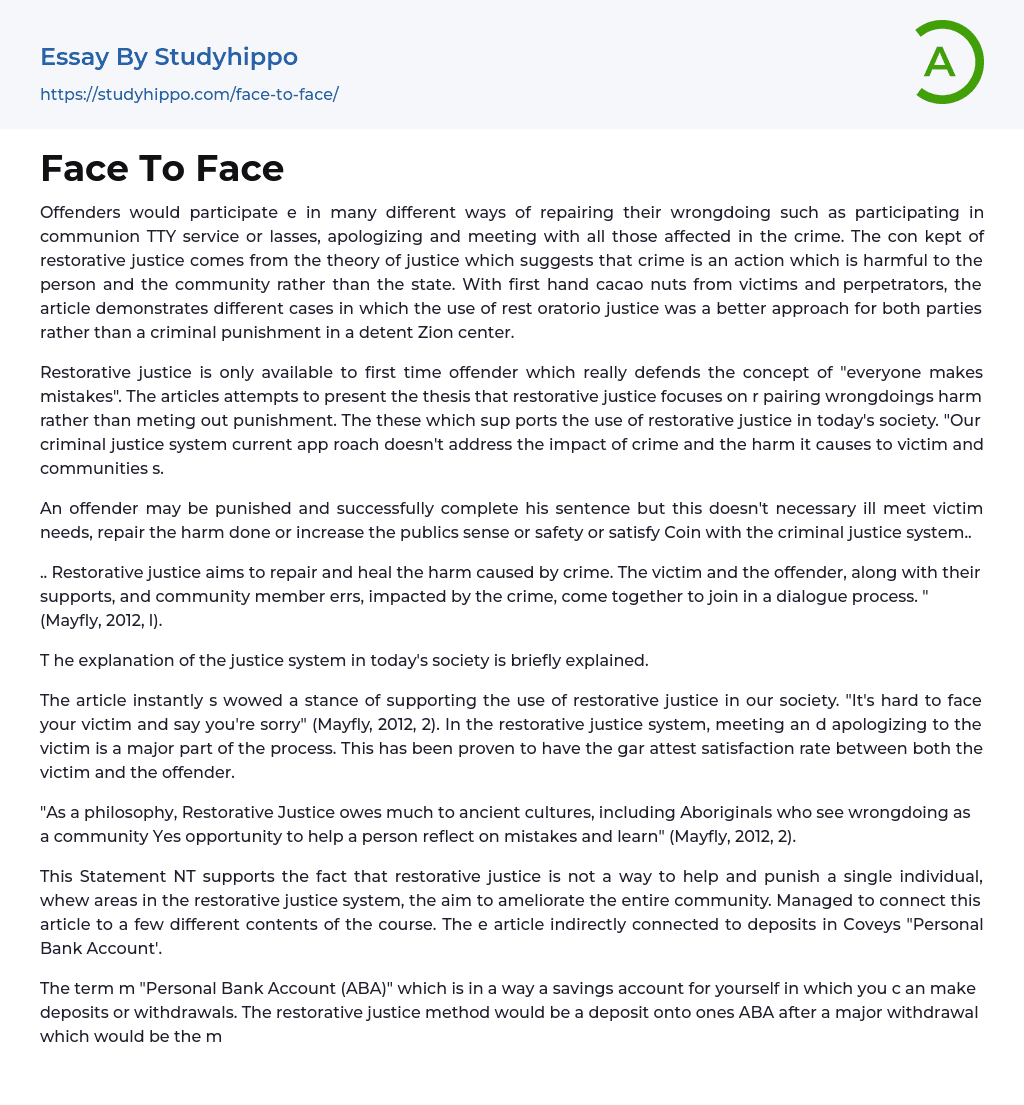Restorative justice holds that offenders can make amends for their wrongdoing through various means, such as apologizing, participating in communion, TTY service or lasses and meeting those impacted by the crime. Unlike traditional criminal punishment which emphasizes punishing offenders who may not meet victim's needs, repair harm done, increase public sense of safety or satisfy them with the criminal justice system alone; restorative justice focuses on repairing harm caused by criminal activity. This approach is accessible only to first-time offenders since everybody makes mistakes. The theory of justice suggests that crime harms both individuals and communities rather than just the state. The article presents firsthand accounts from victims and perpetrators showing how restorative justice is a better alternative for all parties involved compared to detention center punishment. By bringing together victims,
...offenders and their respective supporters along with community members affected by crimes in a dialogue process within the sphere of restorative justice; it aims at healing damage caused by criminal activity.
The author prefers an approach in which the offender confronts and apologizes to the victim, known as restorative justice. This philosophy has roots in ancient cultures, such as Aboriginal beliefs that wrongdoing presents an opportunity for reflection and learning within the community. The goal of this approach is to improve the entire community rather than simply punishing one individual. Covey's notion of a "Personal Bank Account" relates to this idea, with individuals able to deposit or withdraw from their own account of personal relationships. Committing an offense can be viewed as a significant withdrawal from one's ABA, but utilizing restorative justice can act as a deposit by evoking remorse towards the victim and
fostering a better understanding of one's actions. However, past laws like the requirement for a secondary school diploma before obtaining a driver's license contradict these principles. Similarly, court rulings often only offer short-term punishment without addressing long-term solutions. The article "Youth Factorization and Violence" also explores this topic by highlighting how young offenders are dealt with using restorative measures, yet young victims are frequently not emotionally compensated for their pain - potentially leading some youth towards criminal behavior due to unresolved trauma.In our project management assignment, we are researching how the opinions of Ireland on driving affect behavior. Due to the significant financial consequences that come with distracted or drunk driving, many people have stopped committing these offenses. Ontario has a unique approach in which individuals who commit offenses can attend restorative justice sessions and classes. This approach aims to rehabilitate them and reintroduce them into society with a new mindset and CLC mean plate. Unlike traditional forms of punishment like fines or jail time, restorative justice focuses on rehabilitation. An example is seen in schools where rude students must apologize and write letters instead of being suspended immediately. Strict punishment is not as effective as restorative justice because some individuals may continue negative behaviors despite punishment. Restorative justice is an essential tool for improving society, with research showing it's most effective in achieving victim satisfaction and offender accountability through dialogue between offenders and victims. The article presents different perspectives on the stories of victims and offenders, which significantly impacts the functioning of the justice system.While restorative justice may not always serve the victim's best interests, it is often the most fulfilling solution for them.
Additionally, such cases tend to be less expensive than imprisoning victims. Extensive research and calculations have shown that rehabilitating offenders and integrating them back into society is a more beneficial option for society as a whole compared to isolating them.
- Jurisprudence essays
- Social Injustice essays
- Juvenile Justice essays
- Mass Incarceration essays
- Agreement essays
- Business Law essays
- Common Law essays
- Community Policing essays
- Constitution essays
- Consumer Protection essays
- Contract essays
- Contract Law essays
- Copyright Infringement essays
- Court essays
- Crime essays
- Criminal Law essays
- Employment Law essays
- Family Law essays
- Injustice essays
- Judge essays
- Jury essays
- Justice essays
- Lawsuit essays
- Lawyer essays
- Marijuana Legalization essays
- Ownership essays
- Police essays
- Property essays
- Protection essays
- Security essays
- Tort Law essays
- Treaty essays
- United States Constitution essays
- War on Drugs essays
- Animal Cruelty essays
- Charles Manson essays
- Crime Prevention essays
- Crime scene essays
- Criminal Justice essays
- Criminology essays
- Cyber Crime essays
- Damages essays
- Detention essays
- Distracted Driving essays
- Drug Trafficking essays
- Drunk Driving essays
- Forensic Science essays
- Gang essays
- Hate Crime essays
- Homicide essays




